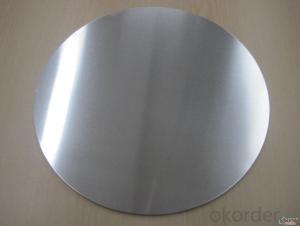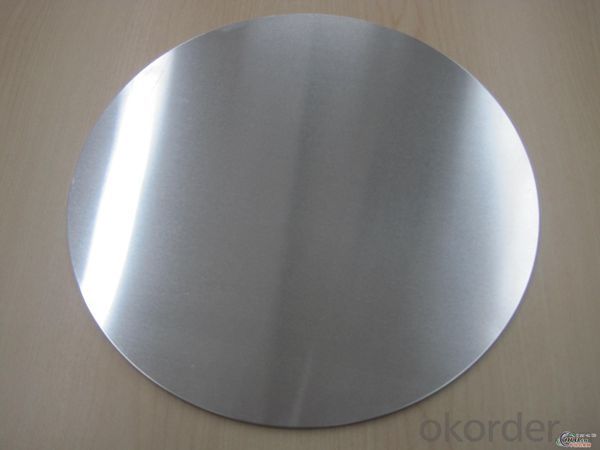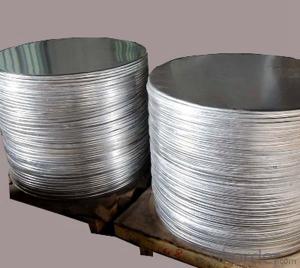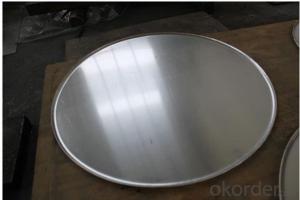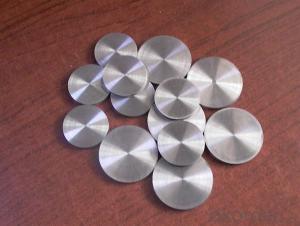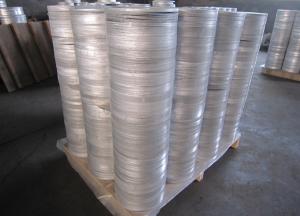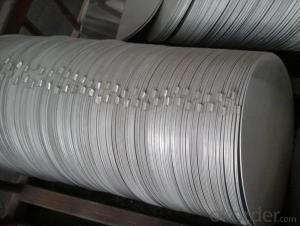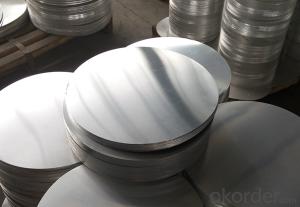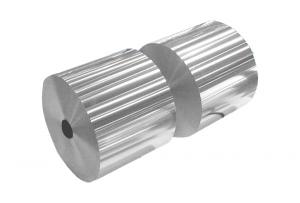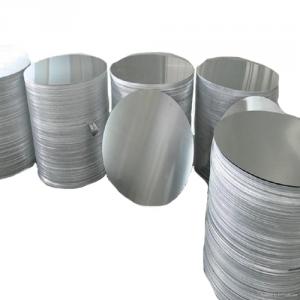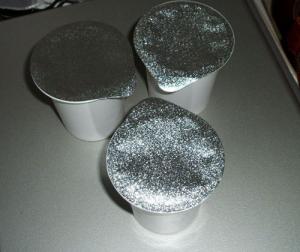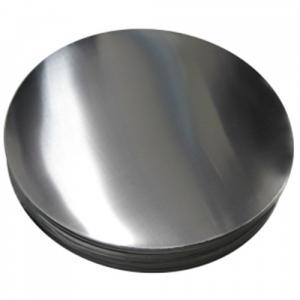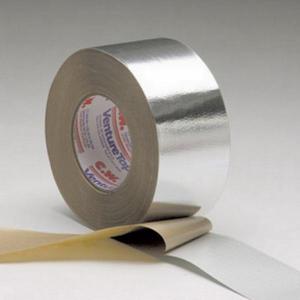Aluminum Circle for Pressure Pan Hot Rolled AA1100
- Loading Port:
- Shanghai
- Payment Terms:
- TT OR LC
- Min Order Qty:
- 5 m.t.
- Supply Capability:
- 10000 m.t./month
OKorder Service Pledge
OKorder Financial Service
You Might Also Like
Specification
1.Structure of Aluminum Circle for Pressure Pan Hot Rolled Description
• Product: Aluminim Circle
• Application: It is used in cookware, engineering, lighting purpose, fried pans, non-sticky pans, cooking pots, kettles, hard anodize cook wire, pressure cooker and house hold utensils, reflector of the light, etc
• Advantage: Deep drawing and hard anodizing quality Aluminum Circle Sheet can be supplied. Our Aluminum Circle is RoHS and REACH compliance and uses well-protected packing. Our circles are excellent material for producing cookware, utensil, pots, pans and kettles.
2.Main Features of the Aluminum Circle for Pressure Pan Hot Rolled
• High manufacturing accuracy
• Smooth surface
• No waves
• High strength of extension and yield
• Well packaged
3.Aluminum Circle for Pressure Pan Hot Rolled Images
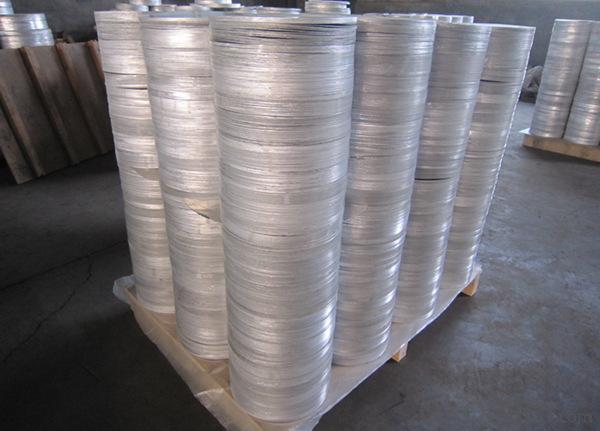
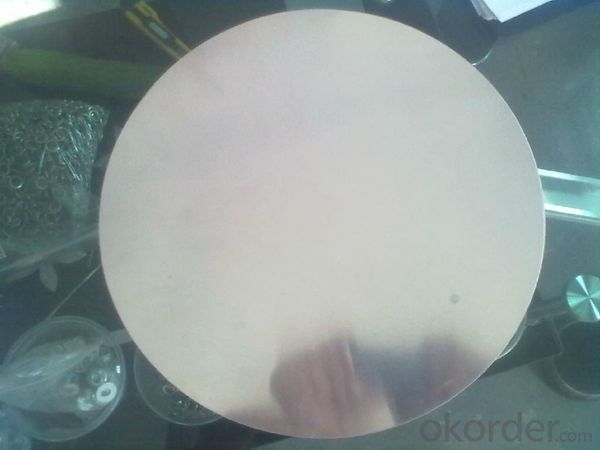
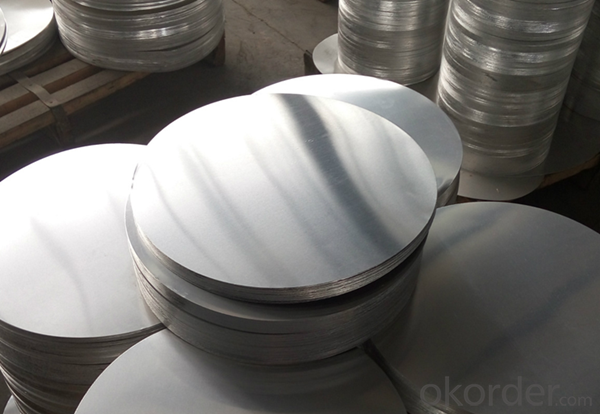
4.Aluminum Circle for Pressure Pan Hot Rolled Specification
Alloy | AA1050,AA1060,AA1100 AA3003etc. |
Temper | O,H14 |
Thickness | 0.5MM-4MM |
Diagonal | 100-1200MM |
Standard | GB/T 3880-2006 |
5.FAQ of Aluminum Circle for Pressure Pan Hot Rolled
We have organized several common questions for our clients,may help you sincerely:
① How about your company?
A world class manufacturer & supplier of aluminum coil and alloy blanks. Aluminum production base is comprised of 18 aluminum annealers, 10 coil and foil mills, 4 continuous production lines, 2 hot rolling production line and 3 prepainted lines.
Export 5000 tons per month to Asia, America and Middle East. Always do the best for our clients.
②Can you guarantee the quality of the products?
We are responsible for the quality of materials to get a long-term cooperation with clients in a reasonable period of time and we are glad to arrange and coordinate any third party inspection for you.
③What is the delivery time after purchase?
35 day after receiving client’s deposit or correct LC
- Q: This question asks about the interaction between aluminum and electromagnetic radiation, specifically how aluminum influences or is affected by such radiation.
- <p>Aluminum has a high electrical conductivity and is a good reflector of electromagnetic radiation. It reflects a wide range of frequencies, including visible light, ultraviolet, and infrared radiation. Due to its reflective properties, aluminum is used in applications such as reflective coatings for insulation and mirrors. It also has the ability to shield against electromagnetic radiation, making it a common material in the construction of Faraday cages, which are used to block external electromagnetic fields. Aluminum's effect on electromagnetic radiation is primarily through reflection and shielding, rather than absorption or transmission.</p>
- Q: Is it possible to utilize recycled aluminum for the production of cars or other types of vehicles?
- <p>Yes, recycled aluminum can be used to make cars and other vehicles. It is common practice in the automotive industry to use recycled aluminum in the manufacturing process due to its lightweight and strong properties. Recycled aluminum requires less energy to produce than new aluminum, making it more sustainable. It is used in various parts of vehicles, including engine components, body panels, and wheels. The use of recycled aluminum not only reduces waste but also contributes to energy savings and carbon emission reductions in vehicle production.</p>
- Q: Is the accumulation of aluminum in the body harmful to health?
- <p>Aluminum buildup in the body has been a subject of concern, particularly in relation to Alzheimer's disease. While aluminum is naturally present in the environment and is used in various products, including food packaging and cookware, there is no strong scientific evidence to support the claim that aluminum exposure or accumulation causes health problems in humans. The World Health Organization and other health authorities have stated that aluminum intake from food and drinking water is not a significant health risk for the general population. However, it is always recommended to follow good hygiene practices and use cookware that is known to be safe for food preparation to minimize any potential risks.</p>
- Q: This question asks about the various applications of aluminum in the construction industry.
- <p>Aluminum is widely used in construction due to its lightweight, high strength, and corrosion resistance. It is commonly used in window frames, door frames, curtain walls, and roofing systems for its durability and energy efficiency. Aluminum is also utilized in structural components such as beams and columns, as well as in the manufacturing of prefabricated buildings. Additionally, it is used in the electrical wiring and conduits within buildings due to its excellent conductivity. Its versatility makes it a popular choice for both residential and commercial construction projects.</p>
- Q: Explain the interaction between aluminum and oxygen.
- <p>Aluminum and oxygen have a reactive relationship. When aluminum is exposed to oxygen, it forms a thin, protective layer of aluminum oxide on its surface. This oxide layer prevents further oxidation of the aluminum beneath it, making aluminum a corrosion-resistant metal. The reaction is exothermic and can be represented by the chemical equation: 4Al + 3O2 鈫?2Al2O3. This aluminum oxide layer is hard and stable, which is why aluminum is widely used in various applications where resistance to corrosion is important.</p>
- Q: This question asks about the methods and steps involved in processing aluminum.
- <p>Aluminum processing involves several key steps: extraction from bauxite ore, refining, and fabrication. Initially, bauxite is mined and then processed to remove impurities. The Bayer process is commonly used to extract alumina (aluminum oxide) from bauxite by dissolving it in a caustic soda solution. The alumina is then smelted in a reduction furnace using the Hall-H茅roult process, where it is dissolved in molten cryolite and electrolyzed to produce pure aluminum. Finally, the aluminum is shaped and fabricated into various products through methods such as casting, extrusion, or rolling.</p>
- Q: Does aluminum have the ability to corrode or deteriorate over time?
- <p>Yes, aluminum can corrode, but it typically forms a protective oxide layer on its surface when exposed to air, which prevents further corrosion. This layer of aluminum oxide is very thin but strong and stable, making aluminum highly resistant to corrosion. However, under certain conditions such as exposure to certain chemicals or in the absence of oxygen, aluminum can still corrode. Corrosion can also occur if the protective layer is damaged or compromised.</p>
- Q: What are the typical applications for aluminum sheet metal?
- <p>Aluminum sheets are versatile and have numerous applications due to their lightweight, corrosion resistance, and strength. Some common uses include construction for roofing and siding, automotive parts such as body panels and heat sinks, packaging for food and beverages, aerospace for aircraft components, and in the manufacturing of electronic devices due to its good thermal conductivity. They are also used in signage, furniture, and various decorative applications.</p>
- Q: Is it possible to employ methods for recycling aluminum that are less harmful to the environment?
- <p>Yes, there are less harmful methods for recycling aluminum. One such method is mechanical recycling, which involves shredding and melting aluminum without the need for chemical processing, reducing environmental impact. Additionally, promoting a circular economy by designing products for disassembly and recycling can minimize waste. Encouraging consumer participation in recycling programs and improving recycling technology also contribute to more sustainable aluminum recycling practices.</p>
- Q: Is aluminum capable of functioning as a catalyst in chemical reactions?
- <p>Aluminum is not typically used as a catalyst in chemical reactions. Catalysts are substances that increase the rate of a chemical reaction without being consumed in the process. Aluminum, being a metal, does not have the properties necessary to act as a catalyst in most reactions. However, it can be used in certain reactions as a reducing agent or in the form of organoaluminum compounds, which may participate in catalytic processes, but these are not common applications.</p>
Send your message to us
Aluminum Circle for Pressure Pan Hot Rolled AA1100
- Loading Port:
- Shanghai
- Payment Terms:
- TT OR LC
- Min Order Qty:
- 5 m.t.
- Supply Capability:
- 10000 m.t./month
OKorder Service Pledge
OKorder Financial Service
Similar products
Hot products
Hot Searches
Related keywords
